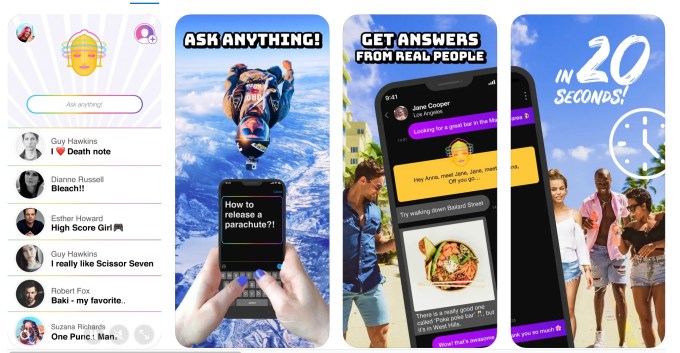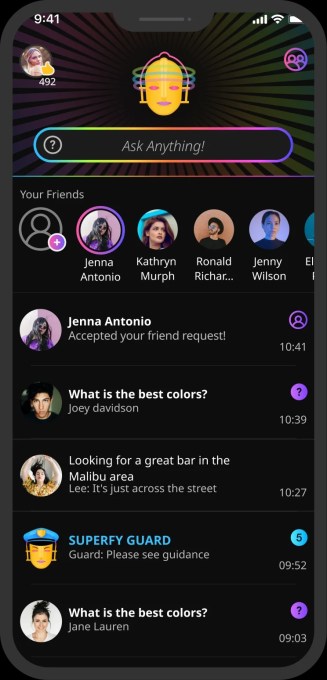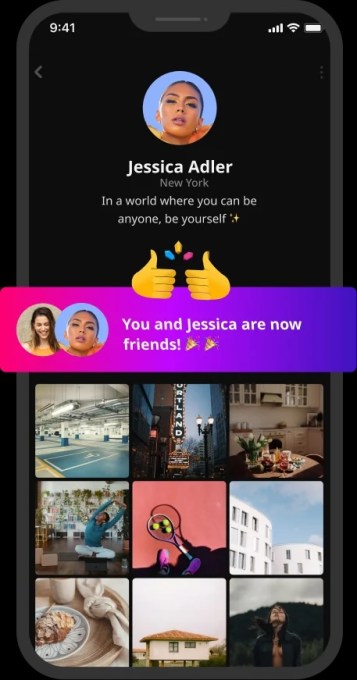Anti-ChatGPT app Superfy uses AI to match people for live chats and answers to queries
There are some things an AI chatbot can’t reliably answer, like how to solve a problem in your relationship, which outfit looks best, advice on a problem you’re facing or maybe a list of personal recommendations about which movies or shows to watch, among other things. For these types of questions, users today still turn to other people — and online, that means using platforms like Reddit or Quora to get answers from other humans, not AI bots. Now, a mobile app called Superfy is looking to use AI to better connect its users to other people for answers to these types of questions in a new live chat social experience.
Originally envisioned as a sort of “Quora on steroids,” Tel Aviv-based Superfy was launched in 2021 by married couple Michal Tamir and Gil Schoenberg, who previously worked together at the Israeli-based data analytics company Treato. They imagined a way to use AI technology to match users in real time with relevant people to answer their questions — that is, instead of typing questions into a search engine or chatting with ChatGPT, Superfy users could talk to real people to get answers and advice.

Image Credits: Superfy
The system uses a fully proprietary AI technology, Matchpoint AI, built on top of open source LLMs to enable the matches. Its machine learning algorithms and AI models match users based on a variety of factors, including not only who’s online right now, but also if they typically use the app at a certain time of day, if they tend to answer a lot of questions and if they have expertise that’s relevant to the specific query. For example, if someone asks, “Should I buy an Ibanez or a Gibson guitar?” the AI would try to match them to a user that has knowledge of instruments and music. But for queries asking for recommendations, the AI will match users based on the personal relevance of the reply to the user who posted the question.
The system involves an auto-generated dynamic database that identifies patterns within users’ discussions, instead of using classic NLP (Natural Language Processing) methods and pre-indexed dictionaries, the company explains. Over time, the engine learns from users’ behaviors about their interests, knowledge and usage patterns to better connect them with relevant queries. The new LLM-based Matchpoint AI also considers topic-related understanding and users’ shared interests, as well as “personal chemistry” when matching.

Image Credits: Superfy
The startup claims that only 10% of posts are niche questions that don’t get answered fast enough by real people. In those cases, the Superfy bot will offer an automatic answer while users wait for human responses. The median time to get the first response from a real person is just around 20 seconds, Superfy’s founders tell TechCrunch.
The app will also send out push notifications to users who are not online to solicit more answers.
Although only available on iOS, Superfy claims to have 550,000 registered users and 85,000 monthly active users who engage with its app — primarily a young, Gen Z audience based in the U.S., Canada and the U.K.
“For them, all of their popular social networks — TikTok, Instagram — are more about watching content and none of them fulfills one of the original purposes of the internet — which was connecting with other people from around the world,” the founders wrote in response to an email Q&A with TechCrunch. (A live interview was not possible as the founders are based in Tel Aviv, facing air raid sirens and school closures as a result of the Israel-Hamas war.)
“Add to that the fact that they don’t use Quora or forums, and also don’t use Google anymore to search because they want to hear from real people — Superfy in their eyes is something completely new, and the only place where they can instantly connect with relevant people and discuss everything on their mind,” they responded.
In time, however, they foresee Superfy expanding to reach a broader audience beyond Gen Z.

Image Credits: Superfy
In the months since its launch, the app has evolved from being an easy way to get quick answers to questions, like a live Quora, to become more of a place for users to have meaningful conversations with relevant people, the founders said. Plus, unlike sites like Quora and Reddit where only a small percentage of users contribute content, around 85% of Superfy’s users actively engage with the app by asking or answering questions. That has to do with the app’s chat-like interface which creates a more personal experience, the AI matching and its accuracy in connecting the right people, Tamir and Schoenberg told TechCrunch.
This experience leads to more subjective answers, where users contribute their own ideas, tips, recommendations and support, not necessarily the “right” answer, like AI chatbots aim to produce. This also leads to users spending more time in the app — the average time spent is now 31 minutes per day, as users engage in multiple chats and sessions per day, of approximately 160 seconds per session across an average of 16 chats per day. In total, users send over 10.5 million messages per month, the founders said.
As for what’s next for Superfy, the team said they’re trying to continue to work, despite the situation in Israel.
“It’s definitely not an easy situation, but we try to get back to routine and keep working. Our users are from the U.S. and around the world, so they are not impacted, and so it’s business as usual as much as possible,” they told us.
Superfy is backed by $5 million in funding plus an additional $1.5 million in grants from the Israeli Innovation Authority (IIA). The funding was across three rounds, most recently in September 2022, and they’re currently raising a post-seed round. Investors include friends and family, and private angel investors, such as Alon Matas, founder and president of BetterHelp, and the founders of an Israeli casual gaming company, Ilyon acquired by Miniclip.
The app is a free download on iOS, currently without in-app purchases.


